Integrating digital skills and artificial intelligence into each course not only prepares students for careers, but also creates a generation of technology-savvy citizens, ready for the knowledge economy .
Six domains of competence
Not only domestic universities, international educational institutions also consider digital capacity as a top priority. RMIT University Vietnam has a clear strategy in the context of AI's increasingly widespread presence. Students are equipped with both digital and human skills, mastering technology tools for learning, creativity and collaboration. RMIT emphasizes the role of "empowering" learners, encouraging confidence in using and criticizing AI. The school is committed to applying AI in an ethical, transparent and prudent approach.
In early 2025, the Ministry of Education and Training issued Circular No. 02/2025/TT-BGDDT (Circular 02/2025) regulating the Digital Competency Framework for learners, marking an important turning point in standardizing and developing digital competencies in the national education system.
This Circular is widely applied to educational institutions, training programs and learners in the entire national education system, and is also aimed at relevant organizations and individuals.
The digital competency framework is not only a tool for developing curriculum standards and learning materials, but also a basis for assessing learning outcomes, testing, and recognizing learners' digital competencies. The issuance of this competency framework helps ensure consistency in training requirements, while facilitating comparison between domestic and foreign educational programs.
According to Circular 02/2025, the digital competency framework is designed to include 6 competency domains with 24 component competencies, divided into 4 levels from basic to advanced according to 8 levels. The competency domains include: Data and information mining; Communication and cooperation in digital environment; Digital content creation; Safety in digital environment; Problem solving; Application of artificial intelligence (AI).
Each competency domain is described in detail, from data searching and management skills; effective communication through digital channels; content creation; personal data protection; to critical thinking and ethical and responsible application of AI. In this context, higher education plays a pioneering role in building digital competencies for students - the country's future workforce.
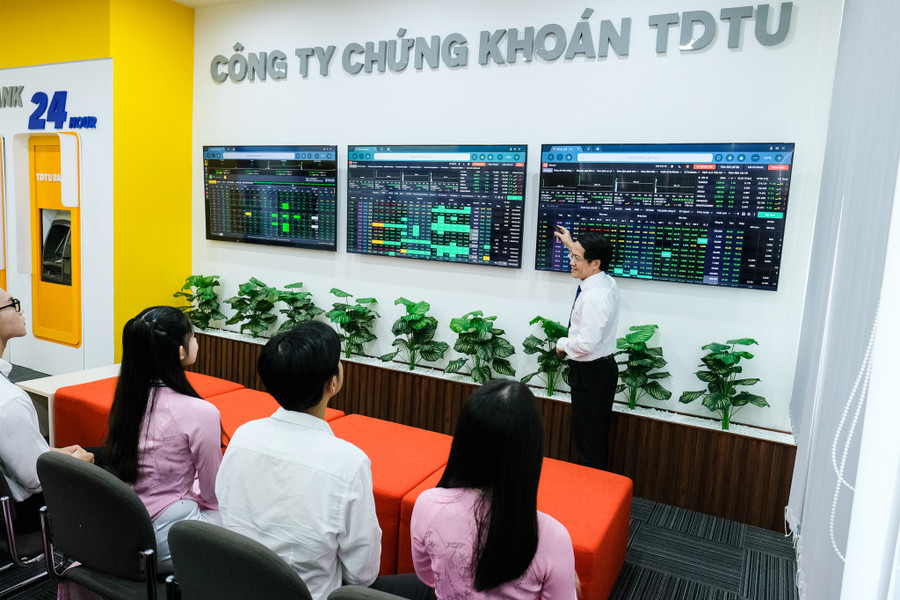
Proactive implementation
In fact, before Circular 02/2025 was issued, many universities had proactively implemented digital transformation programs, integrating technology into teaching and learning.
One of the leading units is the University of Social Sciences and Humanities (Vietnam National University, Hanoi). Since 2020, the school has cooperated with Meta Group to implement a project to improve digital capacity for students. The result is a digital capacity framework specifically for students, announced in May 2024. Since 2023, the school has continued to cooperate with Meta in the project to train AI capacity for lecturers and students. More than 250 lecturers, specialists and 1,000 students have been thoroughly trained in AI, contributing to the formation of a separate AI capacity framework for students.
At the workshop on Digital Competency Framework for Learners (HCMC, July 2025), Associate Professor Dr. Do Van Hung, Head of the Faculty of Information and Library Science, emphasized the strategy of approaching digital competencies based on humanistic foundations, with the philosophy: "Technology for people - People master technology". The school has established new output standards, innovated training programs and deeply integrated digital technology into each subject. Liberal education and social responsibility are also integrated to comprehensively develop learners.
Specialized courses such as Digital Citizenship, Information Skills, Digital Ethics, AI are systematically designed; along with seminars and intensive courses to improve digital capacity for lecturers and students. The school's digital capacity framework aims to develop long-term adaptive capacities: Flexibility, growth mindset, personal autonomy, creative problem solving, communication - cooperation, project management. These capacities develop according to a 4-level roadmap: Proficiency, proficiency, expertise and mastery.
Another example is Ho Chi Minh City Open University, which built a roadmap for digital capacity implementation quite early, through 4 stages: Before 2013, 2013 - 2019, 2020 - 2025 and from 2025 onwards. Dr. Le Xuan Truong - Vice Rector said that since 2020, the school has implemented a blended learning model (combining face-to-face and online learning) for full-time students, creating a digital foundation in training.
Ho Chi Minh City Open University utilizes the online learning system (LMS) to provide a rich repository of resources: Video lectures, e-books, and in-depth documents. Students can access knowledge, actively check, discuss on forums, and practice communication and digital collaboration skills.
Interactive activities such as assignment feedback and professional exchanges on LMS are synchronized with face-to-face learning, creating a flexible and engaging learning space. Since the end of 2022, when ChatGPT became popular, Ho Chi Minh City Open University has quickly updated the program, guiding students to use AI to search, develop ideas, and solve problems. Lecturers also emphasize the skills of comparing and verifying information from AI with academic sources, training critical thinking and ensuring reliability.
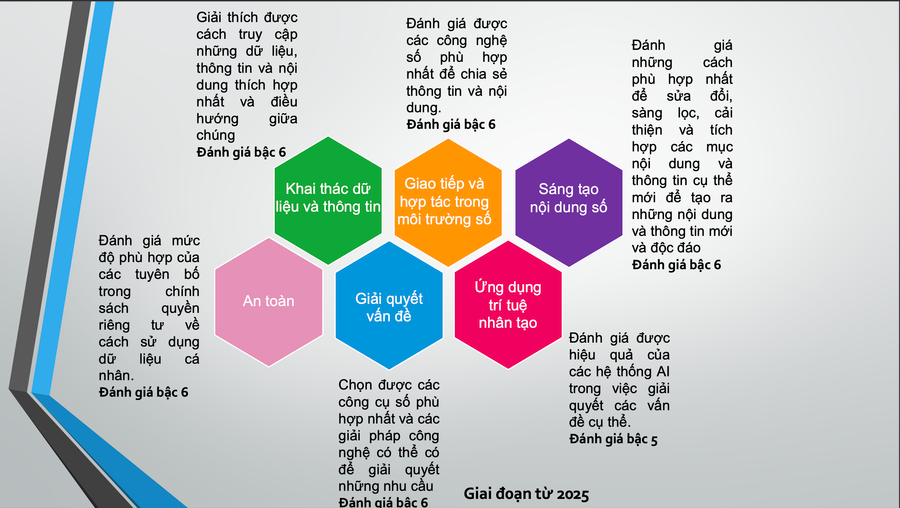
Bringing digital literacy into every subject
The issuance of Circular 02/2025 not only requires standardization of digital competencies, but also motivates schools to proactively innovate their curricula. Many universities have quickly caught up, integrating digital competencies into each subject and module, instead of being confined to basic information technology modules.
Ho Chi Minh City University of Technology (HUTECH) builds a modern educational ecosystem with three pillars: AI, digital transformation, and sustainable development. Prof. Dr. Nguyen Trung Kien - Vice Rector said that the training program integrates digital and AI competencies throughout, linked to each subject, based on 5 core elements: Project design thinking, sustainable development, applied AI, technology, and professional experience.
Since March 2025, Thu Dau Mot University (HCMC) has been working with senior experts to deploy technology solutions to meet the requirements of Circular 02/2025. The school aims to apply AI and Blockchain in administration and training, focusing on student data management, document digitization, and the development of AI tools to support teaching, academic advising, and enrollment, etc. to improve management efficiency and training quality in the digital age.
Dong Nai University also considers digital competence as a pillar of training innovation. The school applies the digital competence framework in designing output standards, developing programs, and compiling documents. Digital competence content is directly integrated into many subjects, especially IT, research methods, and soft skills.
This is also an assessment tool - from defining requirements, measuring results to testing and recognizing student competencies. At the same time, the school promotes the application of digital technology and AI in teaching, from LMS, class management software, to automatic assessment systems. AI will support many stages: Teaching, testing, assessment, career counseling.
Notably, Ho Chi Minh City Open University continues to be a pioneer in updating the program according to Decision 1504/QD-BGDDT on popularizing digital knowledge and skills for students. The IT program for non-IT students has been adjusted: Consolidating and improving IT knowledge blocks, helping students achieve digital competency levels 5-6 according to national standards.
In particular, the program adds AI application content - competency domain number 6. Students are equipped with basic knowledge of AI, Generative AI, learn how to use AI tools responsibly, ensure ethics and develop skills to choose the right tools.
At Thu Dau Mot University, experts have outlined a framework for digital transformation of higher education with three pillars: Administration, teaching - learning, research - innovation. In which, digital transformation of administration is not only digitizing processes, but also comprehensive restructuring.
The school integrates LMS, AI, Big Data to optimize operations, manage students, lecturers, and programs. Blended learning has become a mainstream trend, helping lecturers shift from traditional methods to personalized approaches, creating conditions for students to learn anytime, anywhere, develop self-study skills and independent thinking.
Source: https://giaoducthoidai.vn/nang-luc-so-tro-thanh-xuong-song-cua-dao-tao-dai-hoc-post748238.html



![[Photo] The 1st Congress of Phu Tho Provincial Party Committee, term 2025-2030](https://vphoto.vietnam.vn/thumb/1200x675/vietnam/resource/IMAGE/2025/9/30/1507da06216649bba8a1ce6251816820)
![[Photo] Solemn opening of the 12th Military Party Congress for the 2025-2030 term](https://vphoto.vietnam.vn/thumb/1200x675/vietnam/resource/IMAGE/2025/9/30/2cd383b3130d41a1a4b5ace0d5eb989d)
![[Photo] General Secretary To Lam, Secretary of the Central Military Commission attends the 12th Party Congress of the Army](https://vphoto.vietnam.vn/thumb/1200x675/vietnam/resource/IMAGE/2025/9/30/9b63aaa37ddb472ead84e3870a8ae825)
![[Photo] General Secretary To Lam receives US Ambassador to Vietnam Marc Knapper](https://vphoto.vietnam.vn/thumb/1200x675/vietnam/resource/IMAGE/2025/9/29/c8fd0761aa184da7814aee57d87c49b3)









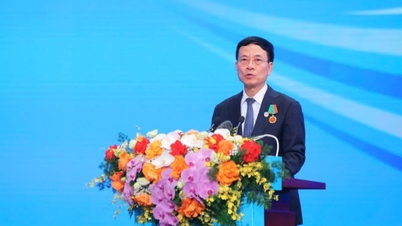

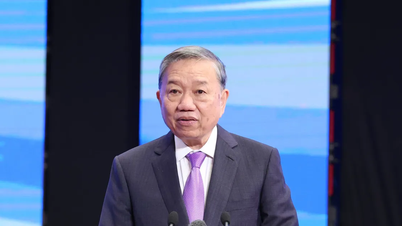













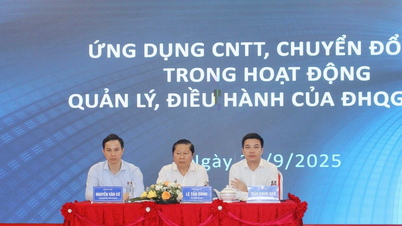
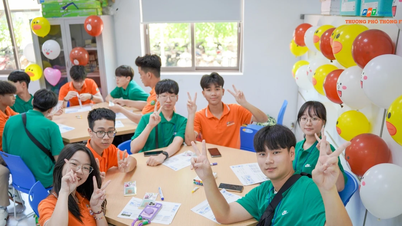




![[Photo] General Secretary To Lam attends the ceremony to celebrate the 80th anniversary of the post and telecommunications sector and the 66th anniversary of the science and technology sector.](https://vphoto.vietnam.vn/thumb/1200x675/vietnam/resource/IMAGE/2025/9/29/8e86b39b8fe44121a2b14a031f4cef46)






























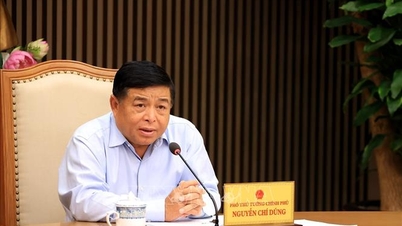

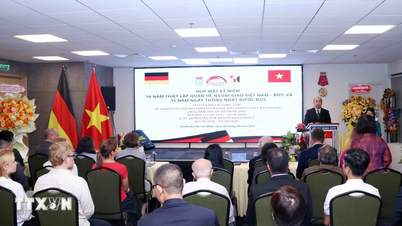




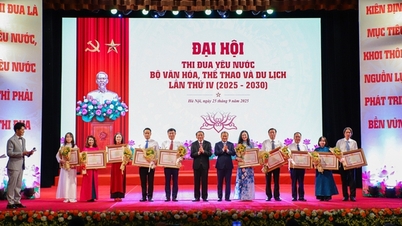









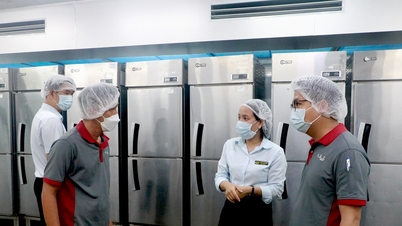


















Comment (0)